Thanks to her
2011 Oscar nom for Best Actress as Ree Dolly in Winter's
Bone, relative newcomer Jennifer Lawrence has now become
one of Hollywood's latest darlings. Of course, there are the perks
of such attention: fancy gowns, cool parties, cute guys and lots of
media attention including having interviewers (like this one) pop
hopefully clever questions. But what a burden. There's that downside
of such accolades the sophomore slump what's up with that?
Telling Ree's
tale, the film details a dirt-poor Missouri Ozarks meth plagued
community in which the 17-year-old holds her siblings together
thanks to a drug-dealing absent father and mentally ill mother. When
she's told they risk losing their house since her missing dad had
put it for collateral to get bail after a drug bust, she searches
for him amongst a dangerous crew of dealers and their associates
including her addled uncle Teardrop (Oscar nominee John Hawkes) who
thinks his brother has been killed.
Debra Granik's
directorial turn has won kudos for all involved. And in the very
male-centric world of mainstream movies, here's an indie developed
by women structured around a strongly female perspective, featuring
a woman who succeeds in a world where the men are domineering
losers. In turn, the tall, willowy Louisville, Kentucky, native
parlayed experience through a subtle performance in the
under-appreciated The
Burning Plain into her break-out performance in Winter's
Bone.
Released in
early 2010, the film won the Grand Jury Prize at the Sundance Film
Festival and earned Lawrence other awards or nominations for Best
Actress at the Gotham Awards, Golden Globes and SAG.
The
20-year-old now has several other features set for release in 2011,
including the Jodie Foster-directed film The
Beaver, in which she co-stars with Foster, Mel Gibson
and Anton Yelchin, as well as X-Men:
First Class and House
at the End of the Street.
She has
appeared in two Sundance Grand Jury Prize winners in a row last
year's Winter's
Bone and this year's Like
Crazy. She is also the second youngest Oscar nominee for
Best Actress in a Leading Role (after Keisha Castle-Hughes, who was
younger when nominated for Whale
Rider in 2002).
How did you
get involved with Winter's
Bone?
Did you audition or meet specifically with Debra about you being in
that role?
No, I had to
fight for it. I auditioned for it three times.
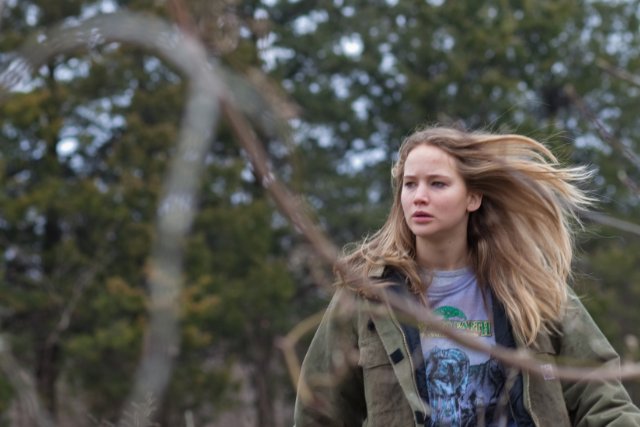 Who
were you up against?
Who
were you up against?
I think
everybody. I auditioned twice in LA and then they said I was too
pretty. So I took the redeye which, just for the record, will take
care of that and flew to New York like a psycho and showed up to
the New York auditions with icicles in my hair and was like "Hi! I'm
back!" I think that once they saw that I had the exact kind of
stubbornness and competitiveness that Ree has, they were like "Oh,
well, nobody else is going to be this stubborn and this crazy to
embark on such a journey."
Did you
find a link to the movie through your Kentucky roots?
There were
some things, there were some sayings that I was familiar with. I am
familiar with the very close family and the hierarchy of the family.
But my life is very different from that of the Ozarks that's
portrayed in the movie.
What was it
like shooting there in Missouri and the Ozarks?
There were no
sets on the whole movie. Everything was real and we spent a lot of
time with the family whose property we were shooting on, the Laysons.
I went up a week before we started filming and spent a lot of time
with them, and that's how Ashlee, who plays my little sister in the
movie, was cast because she lives there. That's her house. We
became so close that we thought why would we cast this when it's
right here? In the book I have two little brothers, but we changed
it to Ashlee.
What did
she think about the experience of being in a movie?
I don't think
she liked it. She had fun because we thought of it as make believe,
but she didn't like the camera, which I thought was awesome. I was
like, you're going to be cool when you grow up. Because when I was a
kid I was like, where's the camera? So I'm always fascinated with
little kids who are shy. I always think they're going to be way
cooler than I could ever be.
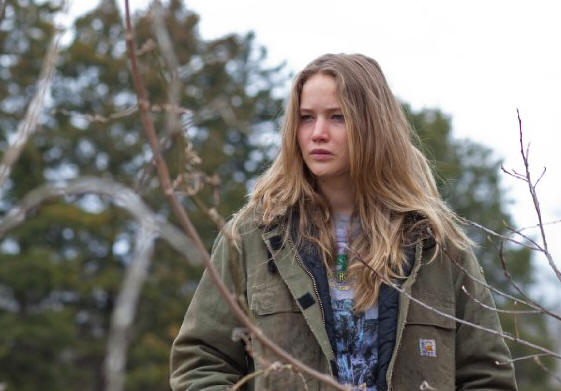 So
you were a real camera whore? (laughs)
So
you were a real camera whore? (laughs)
Oh my gosh!
Like worrisome.
Over the
course of the film, different parts of Ree's character become clear
to the viewer. Debra said that she had to be a larger than life hero
and have overly heroic qualities. At the same time, when Ree has her
first conversation with her friend Gail, she gets the car and is
like, "You are exactly the person I thought you were." If she were
in different circumstances she would have been a little emotional
and manipulative.
I think that
they're sisters, and she just knew what she had to do and the
comment I said to her before when she couldn't get the truck, "You
never used to eat no shit." When you know somebody inside and out,
you know their buttons. And she knows Gail's buttons. So yeah, [Ree]
probably did emotionally manipulate, which is something that we all
do to get what we want or we feel like we need.
What did
you work out about Ree's relationship with her father?
I was confused
about that and I kept asking, because what I felt kept changing when
he left. And it wasn't even that long ago. It's not until we're
adults that we realize our parents are people and that they're not
perfect. What's so sad is when we're younger, if you have a bad
parent, that's normal to you and that's what you think of as
healthy. So if he left when she was little, I think she would have
idolized him. There's a scene in the truck when Blond Milton takes
me to the blown-up trailer and I say, "He's known for knowing what
he's doing," and I'm proud, almost. I'm talking about him cooking
meth and bragging about him. It was very important to keep the
naοvetι in the character and not make her a perfect hero, not make
her smarter than everybody else, and I think that she still has the
17 year old naοvetι. Her dad is still someone that she looks up to
amidst all of this, and that's why she still has respect for her
family.
Did Debra
work up a back story about how the crazy mother ended up like that?
Everybody kind
of said their own thing. In the book it says she just kind of went
into a shell and everything happened too fast and too hard. I think
maybe there are some women that kind of go catatonic after they have
babies, and they realize they can't be a mother and they just kind
of step back. It's like me with a math test as soon as I start
looking at a math test I just freeze, I don't write anything. It's
just too overwhelming, it's too much, and I know I'm not going to be
good at it. That's how I've always viewed her. But I didn't research
and didn't ask around too much. I never want to know more than my
character does because that's not helpful. Anytime Ree is talking
about her mom she's never talking through knowledge about it. She's
never talking from an authoritative point of view. She's always
confused and always thinks, "Well she keeps taking the pill but
they're not doing anything." So I don't think we know, really.
Everybody has theories, but Ree doesn't know. Debra could probably
have the answer, but I didn't really want or need it at the time.
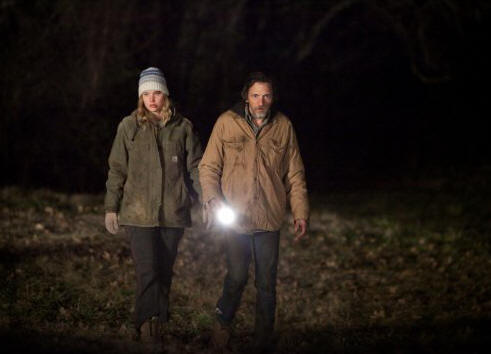 You
read the book?
You
read the book?
I did read the
book.
What
insights did you get from reading the book? Sometimes actors don't
like to read the book before they play the character.
It was
important to read the book because I imagined myself at a Q&A with
people that loved the book. I love the Twilight books.
I'm not even ashamed to say it: they are like methamphetamine to me.
So when I heard Kristen Stewart say, "I only read the first one," I
was like, "Oh man," because she wasn't a huge fan of the books. I
was like, for the book lovers I should probably read the books. I
honestly don't know if the book helped. It could have helped to hear
the inner dialogue of your character, but that would have been if I
was doing an exact replica of the book. Sometimes if a script is
based on a book, that's what you should do: represent the book. I
don't know what I'm doing, so whatever you think happened, great.
I'm reading the script, I'm learning my lines, and then reading the
book, so I read it kind of chapter to chapter. It could have helped
me, but it might not have. I'm still in this early stage where I'm
still learning about myself and my craft and what helps me, and what
I've realized mostly is that I don't have that much of a craft.
How did you
develop your craft?
I don't know.
I'm hoping to come up with an answer before these press days are
over.
Do people
ask you that question?
Yeah, every
time, and I honestly don't know. I never took lessons. I never went
to classes, so I never learned the proper things to do. And then
when I see other actors that come with journals filled with
questions and things that they thought about, I'm like "Should I be
doing that? I should ask more questions, I should argue more," but I
don't. I memorize my lines and I show up. I think it's just
instinctual, and sometimes it's wrong and the director says, "No, do
it this way." Then I can change, because I didn't spend all night
practicing it this one way. All I do to get ready for the day is the
night before, I read my lines once or twice, memorize them, and then
I show up.
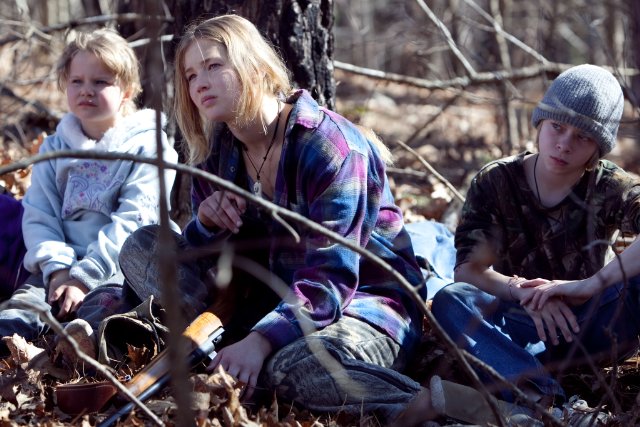 How
is Debra as a director?
How
is Debra as a director?
Debra has a
brain that's not like ours. She has a mind that is on a whole other
playing field. It took me a while to get in sync with that, because
for a while it was like reading instructions, like this is just too
smart for me. If I could only understand what the instructions meant
I could get this radio going, but I just don't get it. Once you
start understanding her, you start realizing she's a genius beyond
genius her attention to detail, though of course so annoying at
the time, because it's like, "Do I really have to do that scene
again? Do I really have to do it this way?" Then I watched it in the
movie and thought, "What if Debra hadn't made me do that again?" As
I grew to understand her, I grew this immense respect for her that I
will have for the rest of my life and I'd do anything for her. It
wasn't like an instant kickoff, like with other people, because
she's not like anyone else. She's smarter than anyone that I know,
that I've ever come in contact with, and that's why she makes such
incredible movies. So I think that our relationship was slow growing
but very long lasting.
Debra spoke
about you on set and about you being convinced that you needed help.
We heard about what she saw and about what your acting partner felt.
What was your impression of that moment?
Everything
that we think comes across in our eyes. Our eyes really are the
windows to our souls, and that's why at least I can tell when
somebody doesn't mean what they're saying if you just look at them
in the eye. So if you're thinking "Please help me, please help me. I
need you," pleading is going to come out of your eyes, I think. I'm
like an open book where I can't hide anything. I think that that was
really all I was saying. I probably just got doe eyed. I have a dad
so I know how to do that. That was more about Dale, because I'm
never going to show up on set with an impression or an idea about
how I'm going to affect another actor. I'm never going to act for
the both of us. I'm going to do what I do and then you react off of
me. I'm going to do my thing and if you react a certain way with
pity or with anger that's up to you, not. So I did my thing, which
was think "I need your help," and look at her I supposed pleadingly,
and she reacted very maternally.
Do you find
yourself to be more of an actor who wants to be led by a director or
do you basically have your thought in mind of how you're going to
portray your character?
I view the
director as my boss. I'm the pawn on the chess board. Though I'm not
going to say anything stupid, there have been times that I've showed
up and said, "I can't say that" but after it goes through nine
levels in my head of "Is this okay to say?" I don't say something to
the director easily, because they are my boss. I think that the
biggest problem if I can speak openly with recorders around me,
which is about to be a mistake I think the biggest reason that
actors are complete a-holes as soon as they become famous is because
they forget that this a job. They think that it's about them and
it's not. We're making a film, and I never feel like I'm above
anyone or I'm even in a different position than you. We are all
doing the same thing, making a movie, except my face is going in
front of the camera, and that's the only difference. You have to go
behind the monitor and make sure I'm doing this right, let's come up
with something to say, and then I'm going to say it in front of the
camera, because that's my job, not because I'm awesome. Yes, we're
all equal because we're all doing the same thing, but the director
is my boss. And if the director says, "I want you to do this,"
unless I feel incredibly strongly about it, which hasn't happened
yet, I'm going to do it because I have respect for my elders mostly.
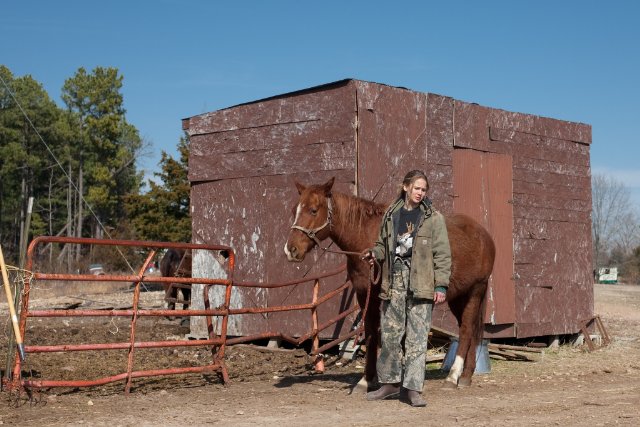 There's
a scene of cutting up the squirrel and taking the guts out. How was
it shooting that scene?
There's
a scene of cutting up the squirrel and taking the guts out. How was
it shooting that scene?
That was me
cutting open a squirrel and touching the guts with my bare hands.
That was disgusting. When they said "Cut," I started shrieking and
jumping up and down. Debra probably thought she miscast. I don't
know. There was like this weird mental place where I went to become
Ree, to chop wood. I honestly do think when you're working out and
you're like, "I don't want to do it anymore," and then you're like,
"I can do this, I'm a runner." Then you can go another mile. I think
I've gotten myself into that mentality of "I can chop this wood,"
and then I did. "I can cut open a squirrel and that's not going to
gross me out until they call cut and then I'm going to shriek like a
little girl."
So you're
not going to become a taxidermist?
I don't think
that's in my future, but I never want to say never.
But you'd
play one?
Oh of course;
I'd play anything. I'd fly to New York on a redeye with icicles in
my hair. This is what I do.
At 19 or
20, there's this huge world out there that you may or may not think
is out there. Do you have certain expectations of yourself? Besides
just what you're doing next, do you have some ideas of goals? What
is your view at 20?
Yeah, I do
have big ambitions, but I think we all do. I just want to keep
working hard and being happy. When I think about myself in five
years, sometimes I think about work and where I'll be in my career.
But I normally just think about what kind of person I'll be. Will I
be calmer or will I be more hyper? Will I learn how to listen or am
I just always going to stay in this kind of 19-year-old zone where I
could just keep talking forever? There are a lot of things that I
know I'm going to learn about myself, because we all do. But yeah, I
have big ambitions.
And no
specific thing?
That's a bad
idea. I learned that you can't have any expectations with life or
with this business. The
Burning Plain was a million dollar movie with huge movie
stars, and everybody was convinced that [it] was going to be huge
and that was my star-making role and that was my big outbreak. Every
movie that has come out has been my breakthrough role. Then Winter's
Bone the one that was a hundred dollars to make, tiny
and everybody thought it will be fun but nobody will ever see it
has gotten huge. You never know what's going to happen.
You have a
vision, you're confident about it, and you take that approach to
life. Is there room in there for a quest for knowledge that you
don't have and what would that be?
Absolutely. I
am the biggest "But why?" question asker. Knowledge is honestly
everything. It's not just books and staying behind a desk and having
a diploma. There's also traveling and knowledge about people, and
what I do and scripts and books. I'm very, very thirsty for
knowledge. Just because I'm good at something and have found success
doesn't mean I'm done. I'm not even close to being done. I don't
know if I ever will be done learning.
Email
us Let us know what you
think.